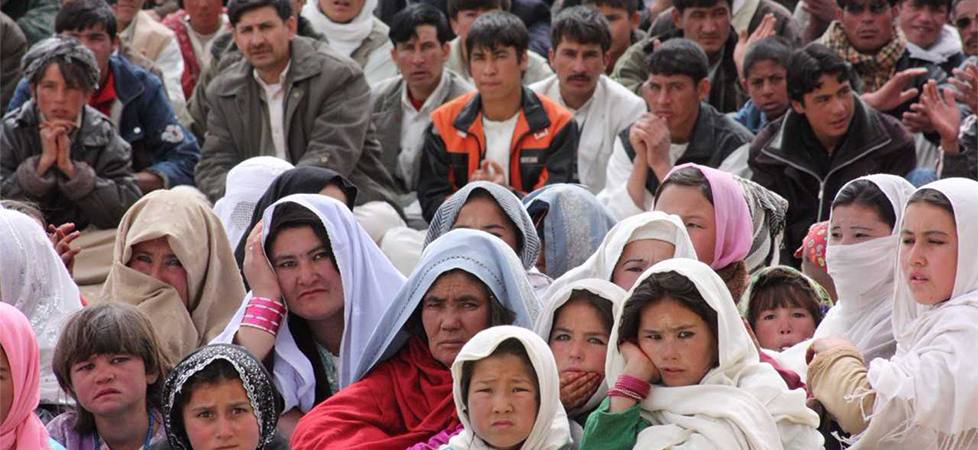Location: Luce Hall Auditorium
Time: 11:00am – 1:00pm, April 14, 2018
Chair: Alessandro Monsutti
By weaving together three innovative papers, this panel charts out major dynamics in Hazara collective identity; exploring the relationship between individual and collective representations of trauma, the forging of new forms of Hazara identity, and the deepening of class relations driven by improving Hazara status.
Melissa Chiovenda – Individual Suffering and Collective Trauma Among Ethnic Hazara Activists in Bamyan
Ethnic Hazara civil society activists in Bamyan, Afghanistan make use of narratives of suffering and trauma to mobilize an ethnic Hazara political base, bring attention to social inequalities suffered by Hazaras, and bring attention to human rights violations and atrocities experienced by the ethnic group. Yet, suffering experienced by individual ethnic activists is rarely foregrounded or presented as evidence of the collectively traumatic past that these activists promote as a key marker of Hazara identity today.
Evidence of collective suffering is most often presented via stories of mass atrocities, such as the mass killings or genocide committed by Amir Abdur Rahman Khan in the late 1800s or the Afshar Massacre of 1993. Activists speak openly of their own traumatic experiences in interviews with the researcher, but do not publicly present them as evidence of suffering by the Hazara people. At times, activists do foreground the suffering of particular individuals who seem to represent a martyr figure, a symbol of the entire Hazara people, in their activities, but this is almost never self-referential. This holds true even in cases when informants experienced traumatic events first-hand, such as the bombing in a bazaar in Quetta, Pakistan in 2013 which killed over 100. This paper will juxtapose collective trauma narratives of activists with individual instances of suffering and traumatic experiences, and will seek to provide an explanation as to why individual suffering is rarely referenced.
Niamatullah Ibrahimi – Religion, Politics and Ethnic Identities in Afghanistan, 2001-17: The Case of Sunni Hazaras
Following the reconfiguration and rehabilitation of Afghan state institutions and social changes that were spawned by the 2001 US-led military intervention, Afghanistan has experienced an upsurge in old and new forms of identity politics. While the country continues to be seen by many either through the prism of colonial era tribal and conservative politics or more recent conceptions of power rivalries among the country’s major ethnic groups, smaller ethno-cultural groups have also embarked on processes of redefining their collective identities, challenging the dominant narratives and categories, and creating new forms of collective identities and belonging.
This paper will seek to shed light on this process through a detailed study of an ongoing effort at redefinition of a new ethno-religious identity: the Sunni Hazaras of Afghanistan. In 2015, activists of the community formed The National Council of the Sunni Hazaras of Afghanistan, a social association that seeks to carve out a new identity between the predominantly Shia and historically-marginalised Hazaras on the one hand, and the predominantly Sunni and Farsi speaking Tajiks, on the other. The attempt at invention of a new ethno-sectarian identity demonstrate the changing role of religion, language, myths of origin and other markers of ethnic identities in the process of reconfiguration of collective identities between 2001 and 2017. Based on extended observation and interviews of the author with Sunni Hazara activists, the paper will examine the link between institutional change and social change and transformation of ethnic identities in contemporary Afghanistan. The paper will seek to contribute to broader understanding of how broader institutional and social change interact with and influence processes of identity formation in the country.
Naysan Adlparvar – Returnees, Regional Identity and Entitlement: Emergent Class Relations in the Bamyan Valley
Political reconstruction in Afghanistan—including the introduction of a constitutional democracy and the re-structuring of the state along ethnic lines—has led to the politicization of ethnicity. In the Bamyan Valley, this has resulted in a shift in the control of, and access to, productive resources including political appointments, access to education, ownership of reclaimed land and property, and control of the marketplace and interprovincial trade. This shift in power has principally benefitted members of the Hazara ethnic category. And has, in turn, led to an improvement in status for Hazaras vis-à-vis members of other ethnic categories in the Valley; namely Saadat and Tajiks.
Set to this dynamic socio-economic backdrop, this paper argues that the rising status of Hazaras, in addition to an influx of educated ‘returnees’, has resulted in a growing sense of competition and differentiation amongst Hazaras in the Bamyan Valley. The emergent class relations, and associated contestation over access to the new—albeit still scare—productive resources are made on the grounds of legitimacy and entitlement. On the one hand, zawari identity (Hazaras that returned from Iran) is contrasted with that of watani (Hazaras that remained in Afghanistan). On the other, legitimacy and entitlement is contested between Hazaras identifying as Bamyani and Ghaznavi. In conclusion, this paper charts the emergent nature of class relations in the Bamyan Valley, whilst also highlighting the intersectional forms of identity deployed to claim and contest entitlement.


